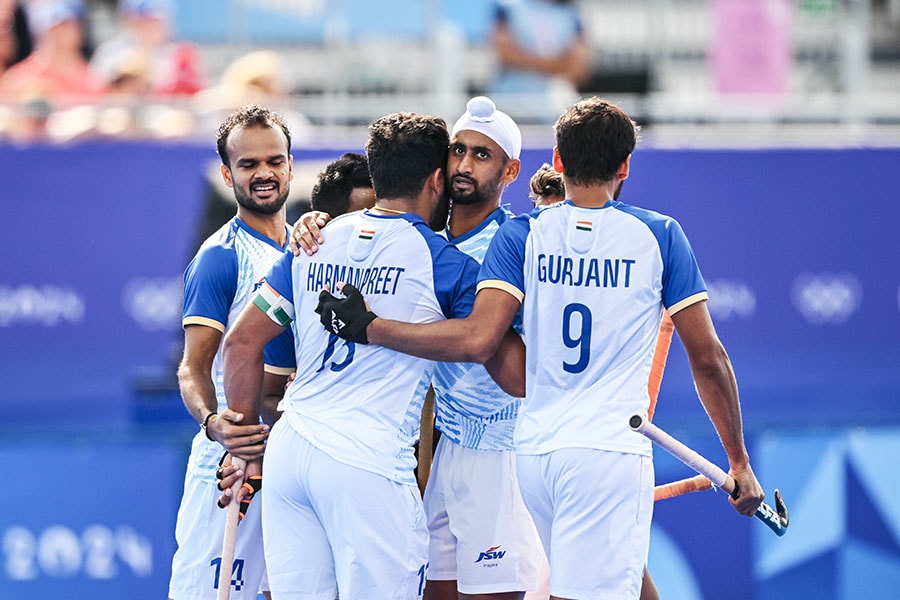Paris Olympics: Will the Indian Men's Hockey team add to the medals tally?
Indian hockey has a rich legacy at the Olympics. All eyes are on Harmanpreet Singh and his team as they take on Spain tomorrow
 India progressed from a tough group that included the top-ranked team Belgium, and then beat Great Britain in the quarter-final in a shootout despite going down to 10 men for more than half the game at the Olympic Games in Paris.
Image: Getty Images
India progressed from a tough group that included the top-ranked team Belgium, and then beat Great Britain in the quarter-final in a shootout despite going down to 10 men for more than half the game at the Olympic Games in Paris.
Image: Getty Images
“Last time what we achieved [at Tokyo Olympics] is a big deal for us,” said Harmanpreet Singh, the Indian hockey captain, after one of their last training sessions at the Sports Authority of India ground in Bengaluru under a scorching afternoon sun. “But that medal hasn’t satisfied everyone. We definitely want to try our best to change the colour of that [bronze] medal [we won in Tokyo]. That’s why we are putting in all this hard work.”
All that hard work paid off as India progressed from a tough group that included the top-ranked team Belgium, and then beat Great Britain in the quarter-final in a shootout despite going down to 10 men for more than half the game at the Olympic Games in Paris. But Singh’s men stumbled against Germany to a late goal in the semi-finals losing 3-2 on the evening of August 6. Yet, they will be able to build on the Tokyo Olympics’ bronze medal and create a new legacy if they beat Spain in the bronze medal game on Thursday at 5:30pm India Time (2pm Paris time).
India has eight gold, one silver and three bronze medals in Olympics hockey. “India has a rich legacy in Olympics [hockey]. We are pushing and pushing to try and recreate some kind of legacy for this new generation of players. It was done really well in Tokyo and now to try and recreate it again is the ultimate challenge. The Olympics is the pinnacle in the world of hockey,” said Craig Fulton, head coach of the Indian hockey team.
Heat Factor
After the rain drenched opening ceremony two weekends ago, Paris has experienced a series of hot days, which the Rings of Fire: Heat Risks at the 2024 Olympics report, published a month prior to the Summer Games, had predicted. Over the last week, Paris has witnessed hot afternoons with peak heat of above 32C around 6pm every day and conditions remain uncomfortable till about 10pm. That means India will take on Spain in these less than ideal conditions that they have prepared for. In the two-week training camp in Bengaluru before leaving for Paris, Fulton made the team train in the peak afternoon heat and had up to three sessions per day. Fulton hopes that heat will prove to be an advantage for India as they are used to much hotter conditions while hockey is a winter sport in Europe. “Because of that mindset, I think [we are better prepared going into] the last 20 minutes of a match… Our team is more used to training in the heat while some of the European teams, because it’s a winter sport, don’t have [experience] of ultimate heat of 30-plus Celsius all the time from October to March. It’s not the only thing [that will determine our success] but it is one of the things… it could help. We don’t mind the heat, let’s put it that way. We are physically prepared to play in the heat and our fitness levels have improved in the year since I took over,” said Fulton.

















